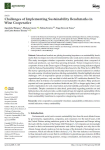Marques A., Guerra M., Ferreira F., Sousa T.A., Teixeira C.A. (2025). Challenges of implementing sustainability benchmarks in wine cooperative. Agronomy, 01/06/2025, vol. 15, n. 6, p. 1408.
https://doi.org/10.3390/agronomy15061408
https://doi.org/10.3390/agronomy15061408
| Titre : | Challenges of implementing sustainability benchmarks in wine cooperative (2025) |
| Auteurs : | A. Marques ; M. Guerra ; F. Ferreira ; T.A. Sousa ; C.A. Teixeira |
| Type de document : | Article |
| Dans : | Agronomy (vol. 15, n. 6, June 2025) |
| Article en page(s) : | p. 1408 |
| Langues : | Anglais |
| Langues du résumé : | Anglais |
| Catégories : |
Catégories principales 05 - DEVELOPPEMENT RURAL ; 5.3 - Institutions RuralesThésaurus IAMM COOPERATIVE VITIVINICOLE ; COOPERATIVE DE PRODUCTEURS ; DURABILITE ; CERTIFICATION ; PORTUGAL |
| Résumé : | International markets are placing increasing importance on sustainability benchmarks that encompass not only environmental but also social and economic dimensions. This study investigates whether cooperative wineries, particularly those composed of small-scale producers, can meet these growing demands. Sixteen winegrowers from a cooperative winery in the Douro region of Portugal were surveyed using indicators aligned with the National Sustainability Certification Benchmark for the Wine Sector (RNCSSV). The survey captured practices from the 2022/2023 season to assess readiness for certification and examine viticultural practices affecting sustainability. Results highlight structural challenges: 57% of respondents operate as family-run businesses, often with informal organizational practices-only one-third of which met the 50% certification threshold. Nevertheless, there is evidence of a transition toward sustainable viticulture. Many producers reported soil cover practices and reduced herbicide use (19% no longer apply them), with positive implications for soil conservation and yield stability, particularly where water is available. Despite constraints in data detail, particularly regarding pesticide use and field practices, the study provides a solid empirical basis for targeted sustainability efforts. These findings may support the development of simplified tools and tailored strategies to foster sustainability transitions in cooperative winegrowing contexts. |
| Cote : | En ligne |
| URL / DOI : | https://doi.org/10.3390/agronomy15061408 |







